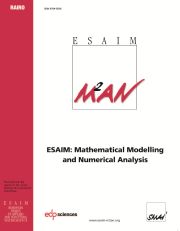Article contents
Corrector Analysis of a Heterogeneous Multi-scale Scheme forElliptic Equations with Random Potential
Published online by Cambridge University Press: 20 February 2014
Abstract
This paper analyzes the random fluctuations obtained by a heterogeneous multi-scalefirst-order finite element method applied to solve elliptic equations with a randompotential. Several multi-scale numerical algorithms have been shown to correctly capturethe homogenized limit of solutions of elliptic equations with coefficients modeled asstationary and ergodic random fields. Because theoretical results are available in thecontinuum setting for such equations, we consider here the case of a second-order ellipticequations with random potential in two dimensions of space. We show that the randomfluctuations of such solutions are correctly estimated by the heterogeneous multi-scalealgorithm when appropriate fine-scale problems are solved on subsets that cover the wholecomputational domain. However, when the fine-scale problems are solved over patches thatdo not cover the entire domain, the random fluctuations may or may not be estimatedaccurately. In the case of random potentials with short-range interactions, the varianceof the random fluctuations is amplified as the inverse of the fraction of the mediumcovered by the patches. In the case of random potentials with long-range interactions,however, such an amplification does not occur and random fluctuations are correctlycaptured independent of the (macroscopic) size of the patches. These results areconsistent with those obtained in [9] for moregeneral equations in the one-dimensional setting and provide indications on the loss inaccuracy that results from using coarser, and hence computationally less intensive,algorithms.
Keywords
- Type
- Research Article
- Information
- ESAIM: Mathematical Modelling and Numerical Analysis , Volume 48 , Issue 2: Multiscale problems and techniques , March 2014 , pp. 387 - 409
- Copyright
- © EDP Sciences, SMAI, 2014
References
- 4
- Cited by


